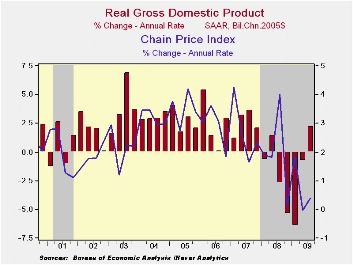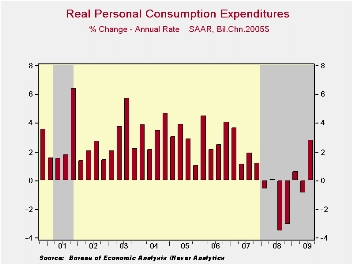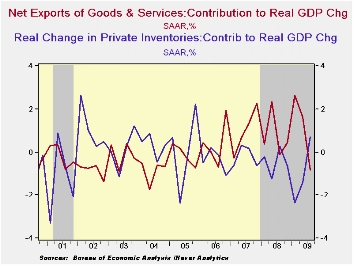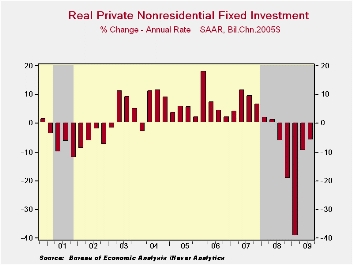 Global| Dec 22 2009
Global| Dec 22 2009U.S. GDP Revised Downward: Domestic Demand & Inventories Are Shaved
by:Tom Moeller
|in:Economy in Brief
Summary
The second revision to 3Q U.S. real GDP lowered growth again, this time to 2.2% (AR) from last month's report of 2.9% growth. The revised figure compares to the advance report of 3.5% growth and was contrary to expectations for an [...]
 The second
revision to 3Q U.S. real GDP lowered growth again, this time to 2.2%
(AR) from last month's report of 2.9% growth. The revised figure
compares to the advance report of 3.5% growth and was contrary to
expectations for an improvement to 2.8%. Still, growth last quarter was
the first positive figure since 4Q 2007. Estimates of economic growth
this quarter recently have been rising to roughly 4.0%.
The second
revision to 3Q U.S. real GDP lowered growth again, this time to 2.2%
(AR) from last month's report of 2.9% growth. The revised figure
compares to the advance report of 3.5% growth and was contrary to
expectations for an improvement to 2.8%. Still, growth last quarter was
the first positive figure since 4Q 2007. Estimates of economic growth
this quarter recently have been rising to roughly 4.0%.
 The
largest surprise in the revision was that domestic final demand growth
was again revised down, to 2.3% from 2.7%. On the fixed-investment
side, business fixed investment fell at an increased 5.9% (-19.6% y/y)
rate. The quarterly rise in residential spending was reduced to 18.9%
(-18.9% y/y) and government investment grew at a reduced 2.7% rate
(2.0% y/y). Real PCE growth was little changed at 2.8% (-0.2% y/y).
The
largest surprise in the revision was that domestic final demand growth
was again revised down, to 2.3% from 2.7%. On the fixed-investment
side, business fixed investment fell at an increased 5.9% (-19.6% y/y)
rate. The quarterly rise in residential spending was reduced to 18.9%
(-18.9% y/y) and government investment grew at a reduced 2.7% rate
(2.0% y/y). Real PCE growth was little changed at 2.8% (-0.2% y/y).
 Another
surprise in the figures was
that the 3Q contribution to GDP growth from inventories was revised
lower to 0.7 percentage points. Nevertheless, the 3Q addition followed
subtractions of 1.4 and 2.4 percentage points during the prior two
quarters, and was just the second positive contribution to GDP growth
in two years.
Another
surprise in the figures was
that the 3Q contribution to GDP growth from inventories was revised
lower to 0.7 percentage points. Nevertheless, the 3Q addition followed
subtractions of 1.4 and 2.4 percentage points during the prior two
quarters, and was just the second positive contribution to GDP growth
in two years.
Accompanying the GDP figure was a little-revised estimate that 3Q corporate profits rose 10.8% versus 2Q. That was the third consecutive quarterly increase and diminished the y/y change to -6.6% from -25.1% at its worst in 4Q' 08. Lower market interest rates lifted earnings in the financial sector by more than one-third (20.5% y/y) and they tripled from year-end '08. Earnings from the rest of the world increased 7.3% (-18.6% y/y) while the end of the recession raised domestic nonfinancial profits by an upwardly revised 4.2% (-10.6% y/y) for the second quarterly increase.
 Deterioration
in the foreign trade deficit subtracted an unrevised 0.8 percentage
points from 3Q GDP growth following an advance estimate of a
0.5% subtraction. Imports grew 21.3% (-14.0% y/y) and the gain in
exports also was little-revised at 17.8% (-10.7% y/y).
Deterioration
in the foreign trade deficit subtracted an unrevised 0.8 percentage
points from 3Q GDP growth following an advance estimate of a
0.5% subtraction. Imports grew 21.3% (-14.0% y/y) and the gain in
exports also was little-revised at 17.8% (-10.7% y/y).
The gain in the GDP price deflator was lowered slightly to 0.4%. The PCE price index was ticked lower to 2.6% (-0.7% y/y) and the rise in the overall domestic final sales price index was brought down to 1.4% (-1.0% y/y).
The U.S. National Income & Product Account data are available in Haver's USECON and the USNA databases.
| Chained 2005$, % AR | 3Q '09 Final | 3Q '09 Preliminary | 3Q '09 Advance | 2Q '09 | 1Q '09 | 2Q Y/Y | 2008 | 2007 | 2006 |
|---|---|---|---|---|---|---|---|---|---|
| GDP | 2.2 | 2.4 | 3.5 | -0.7 | -6.4 | -2.6 | 0.4 | 2.1 | 2.7 |
| Inventory Effect | 0.7 | 0.9 | 0.9 | -1.4 | -2.4 | -0.9 | -0.4 | -0.4 | 0.1 |
| Final Sales | 1.5 | 1.9 | 2.6 | 0.7 | -4.1 | -1.7 | 0.8 | 2.5 | 2.6 |
| Foreign Trade Effect | -0.8 | -0.8 | -0.5 | 1.7 | 2.6 | 0.8 | -1.2 | 0.8 | 0.1 |
| Domestic Final Demand | 2.3 | 2.7 | 3.0 | -0.9 | -6.4 | -2.5 | -0.4 | 1.7 | 2.5 |
| Chained GDP Price Index | 0.4 | 0.5 | 0.8 | -0.0 | 1.9 | 0.6 | 2.1 | 2.9 | 3.3 |
Tom Moeller
AuthorMore in Author Profile »Prior to joining Haver Analytics in 2000, Mr. Moeller worked as the Economist at Chancellor Capital Management from 1985 to 1999. There, he developed comprehensive economic forecasts and interpreted economic data for equity and fixed income portfolio managers. Also at Chancellor, Mr. Moeller worked as an equity analyst and was responsible for researching and rating companies in the economically sensitive automobile and housing industries for investment in Chancellor’s equity portfolio. Prior to joining Chancellor, Mr. Moeller was an Economist at Citibank from 1979 to 1984. He also analyzed pricing behavior in the metals industry for the Council on Wage and Price Stability in Washington, D.C. In 1999, Mr. Moeller received the award for most accurate forecast from the Forecasters' Club of New York. From 1990 to 1992 he was President of the New York Association for Business Economists. Mr. Moeller earned an M.B.A. in Finance from Fordham University, where he graduated in 1987. He holds a Bachelor of Arts in Economics from George Washington University.
More Economy in Brief
 Global| Feb 05 2026
Global| Feb 05 2026Charts of the Week: Balanced Policy, Resilient Data and AI Narratives
by:Andrew Cates






